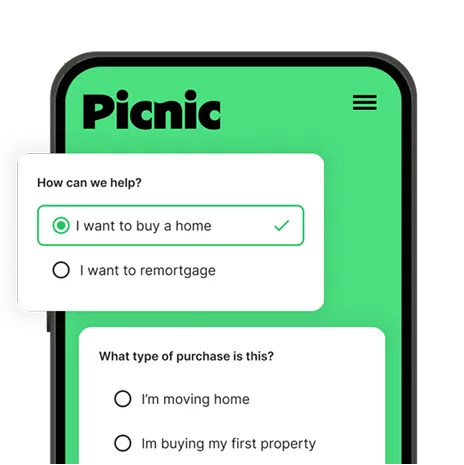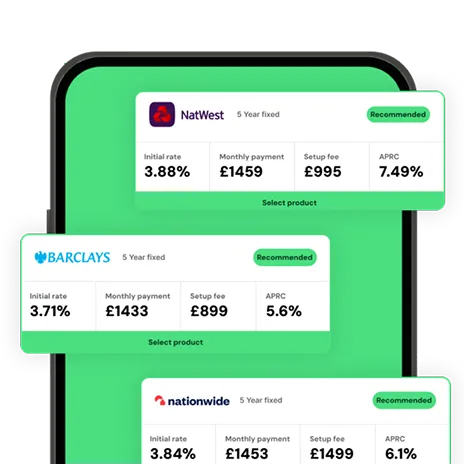Remortgage Calculator
Use our smart calculator tool to get a clearer idea of what you could save when you remortgage with a better rate in seconds.
Release Equity?
Select 'Yes' if you'd like to borrow extra money against your property's value when you remortgage.
New monthly payment:
Your new loan‑to‑value (LTV):
Remaining equity:
Total amount payable:
Total interest payable:
Speak with one of our experts today to learn more about your options.
Get Started NowThis calculator provides an estimate of your monthly mortgage repayments based on the information you have entered. The figures are for illustrative purposes only, your actual payments may differ, and this does not constitute a mortgage offer.
Your home may be repossessed if you do not keep up repayments on your mortgage.

Tell Us About You
Fill out a quick 60-second form — no impact on your credit score, no endless questions.

Mortgage Match
We have access to 20,000+ products across more than 100 lenders (including exclusive deals you won’t find online) to find you the best rate and the right mortgage.

Meet Your Experts
A dedicated team handles everything. You can track your mortgage, conveyancing, and insurance progress directly from your portal.


The Mortgage Experts Trusted by Experian
Picnic is Experian’s exclusive mortgage partner, trusted to make mortgages simple. With access to 100+ lenders and expert support, we’ll help you find the right fit without the stress.
Frequently Asked Questions
Remortgaging 101
Answers to all the key questions if you're looking to remortgage. No jargon. No fluff. Just real guidance to help you feel in control of your remortgaging journey.
Remortgaging means moving your mortgage onto a new deal, typically with a different lender. It’s an opportunity to secure a more competitive interest rate, reduce your monthly repayments, release cash from your home, or change the terms of your mortgage to suit your current circumstances.
In reality, yes, you can. However, the most common time to do it is when your existing mortgage deal is coming to an end. Switching to another deal means you avoid moving on to your lender’s Standard Variable Rate (SVR), which will likely be higher and mean your repayments will jump up.
You can still switch before the term of your existing mortgage deal ends, but this could mean paying an early repayment charge (ERC). If the ERC is higher than the savings you’ll make by moving on to another deal, it doesn’t make financial sense to go ahead.
A standard remortgage should take between 4 and 8 weeks to complete. However, if you're just moving from one deal to another with your existing mortgage lender (known as a Product Transfer), this can usually be done much sooner.
More complex remortgage applications, such as wanting to borrow more money (releasing equity), could take up to 8 weeks or possibly longer, depending on the work needed to complete everything.
The equity in your home - the difference between the property’s value and outstanding mortgage balance - is what mortgage lenders will look to use as a deposit for a remortgage.
So, for example, if your property’s worth £300,000 and your mortgage balance is £150,000, the equity available is £150,000. This would give you a current loan-to-value (LTV) of 50%, which would determine the type of remortgage deal you could qualify for. Lower LTVs mean lower interest rates, as there’s less risk involved for the lender.
Yes, it’s possible. This type of home loan is known as an unencumbered mortgage rather than a remortgage, and is a smart way to release equity tied up in your property to fund home improvements, buy another property, or consolidate unsecured debts.
To find out more, read our guide on Unencumbered Mortgages.
Yes, you can! Many homeowners remortgage to release equity from their property to pay for renovations. If your home’s value has increased since you first took out your mortgage, or if you’ve paid off a chunk of it, you may be able to borrow more.
The main considerations will be whether you can afford the new repayments and if the planned improvements will add value to your home.
Yes, it’s possible. It really depends on the type of credit issue you’ve had, the amounts involved and how long since it happened.
Your choice of mortgage lender can also have a big impact. A specialist lender - one who considers applications on a case-by-case basis - will tend to look more favourably on remortgage applicants with lower credit scores.
To find out more, read our guide: How to Remortgage With Bad Credit.